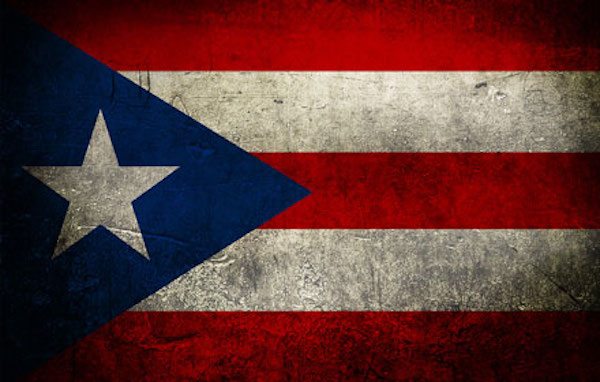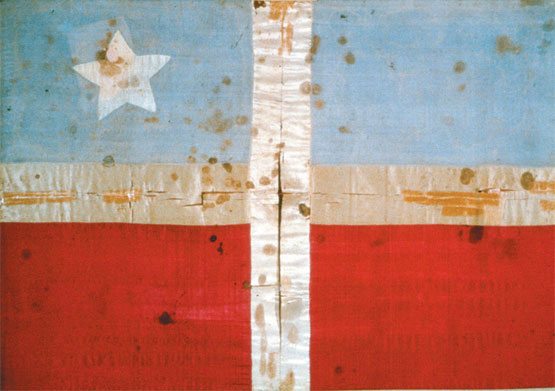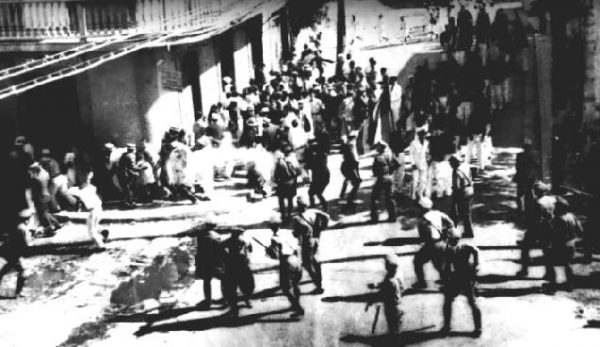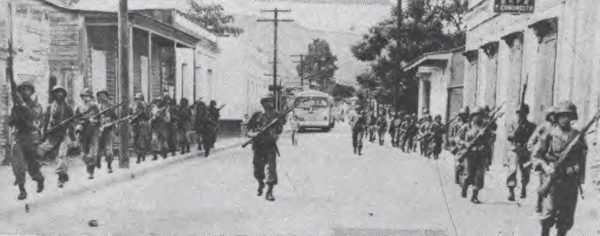

Beyond John Oliver’s and Lin-Manuel Miranda’s poignant commentary on Puerto Rico’s debt crisis on Oliver’s Last Week Tonight (HBO), lies the hard and unfunny truth that the economic situation in the island is not only an economic crisis, but primarily a political one.
In fact, this political crisis is unveiling for many the trappings of the colonial status of the “unincorporated territory,” the perceived general indifference of the federal government to the well-being of Puerto Rico and Puerto Ricans, the rapacious economic relationship between the mainland and the island, and the need on the island and the diaspora to take drastic action to avert the worst from a crisis that has already provoked the greatest exodus of people in the island’s history.
This is a political crisis that has all the built-in ingredients to turn violent: a fact that has not escaped to the federal authorities.
On April 22 a federal judge in Puerto Rico (un)surprisingly ordered three pro-independence former political prisoners —Juan Segarra Palmer, Orlando González Claudio and Norberto Cintrón Fiallo, whose sentences were commuted by President Bill Clinton— to take DNA tests. This was the imperial thing to do, but very little is actually known about why the federal judge ordered these tests, and the federal government has neither denied nor confirmed if the three were involved in any kind of conspiracy.
The general feeling among those who favor Puerto Rico’s independence from the United States (and many others who don’t support independence) is that this action by the federal government amounts to a warning shot to those that are actively critical and unhappy with how the current situation is unfolding: a very clear “Big Brother is watching you” move. After all, these three former political prisoners, who were arrested in the 1980s for “conspiring to overthrow the U.S. government their fight for independence” and for the spectacular no-deaths no-injuries 1982 robbery in Hartford of $7 million from a Wells Fargo depot, are widely considered to be already under constant monitoring. And they have mostly remained out of the public’s view (and definitively out of trouble) for more than 20 years.
What led to this forced DNA tests?
Is the U.S. government preparing for political violence in Puerto Rico?
By now, most readers have a rough idea of the situation in the island. After decades of irresponsible and unsustainable management, the government owes billions of dollars in debt to predatory vulture-fund investors that are demanding their returns take precedence over the payment of retirement pensions, the island education’s budget (10% of schools have already being closed), healthcare and other essential services. These investors have also advanced the idea of reducing the applicable federal minimum wage in the island. On its side, the island’s government has no ability to pay, and in fact has already defaulted on millions of dollars.
The Consequences
In the last decade alone, a significant share of the population has left the island for the mainland as economic refugees (mostly to Florida). Congress is also seriously considering an unelected Fiscal Control Board with broad oversight over the elected government of the island. What is not fully grasped on the mainland is that sizable portions of the island’s residents feel betrayed by the U.S. government, while others are simply having schadenfreude fits because they always “knew” that the colonial status of the island was (and is) unsustainable. Many of the economic refugees did not want to leave the island, and feel they were forced out. A few politicos who previously supported statehood for the island, have publicly declared independence from the U.S. Local elected officials in the mainland have openly mused about the possibility of engaging in civil disobedience actions. A protest march on the island recently condemned the Fiscal Junta and the proposed austerity measures.
Yet, this is just the beginning.
It is in times like these that euphemisms stop working, when political correctness seems incorrect, when apolitical people get politicized, and when small groups of already politicized people decide to turn to violence. For us engaged Puerto Ricans (American citizens since 1917), the main problem as a polity is how to get there (solve the debt and political crisis) without going there (political violence). For Americans on the mainland, the task is to ponder the real possibility that the debt crisis in Puerto Rico could morph into an unstable political situation that will “require” the unseemly deployment of undemocratic and security measures that will negatively impact fellow American citizens living in the island, and that could affect large groups living on the mainland, mostly in the heart of some of America’s largest cities.
I, like the overwhelming majority of Puerto Ricans, despise violence—but I know history. And the history of Puerto Rico is grimly clear in its repetitive cycles of political violence. Mostly suffered by innocent Puerto Ricans.
The story has been roughly the same both under the grip of imperial Spain and U.S. control. In 1511, the native Taíno Indians engaged in a bloody rebellion to end the genocidal abuses of Spanish conquistadors. The rebellion was ultimately crushed, but a year after the King of Spain did pass a law to somehow soften the burden of the Taínos. El Grito de Lares, another armed rebellion planned in part from New York City, occurred in 1868 as a demand for independence from Spain, but primarily calling for the abolition of slavery. Guess what? slavery was abolished five years later, in 1873.


During the 1930s and 1940s the criminal abuses of American sugar interests on the island created widespread misery, hunger and migration to the mainland, and was met with violent armed resistance from well-organized local nationalists. The American response was shameful when in 1937, 21 civilians were murdered during a peaceful march by orders of the local American jefe during what is still remembered as the Ponce Massacre.


Image from Ponce Massacre (Public Domain)
Undaunted, in the 1950’s, these very same nationalists —involved with federal authorities in a vicious unending cycle of violence, unjust jail sentences, extrajudicial executions and reprisals— attempted to assassinate President Truman in the heart of Washington, D.C., while simultaneously rebelling in the mountainous region of the island. The rebellion was ultimately put down (this time with the help of U.S. air power) but, guess what? During the mid 1950s, the iron grip of American imperial control was somehow softened when Puerto Ricans were allowed to write their own constitution and obtained some measure of self-government.


Puerto Rico National Guard troops in Jayuya, Puerto Rico, during the 1950 Jayuya Uprising. (Public Domain)
In 1954, nationalists attacked the U.S. Congress, to protest what many then (and still) see as the colonial status of the island. It bears underlining that from the 1950s onward, political action and political violence was not confined to the island: the attack on Congress, the attempt against Truman, the actions of the Young Lords Party on behalf of Puerto Rico’s independence and the welfare of the Puerto Rican diaspora, a series of bombings and armed attacks (including the 1982 Wells Fargo heist), were organized and put to action in the heart of some of America’s largest cities.
Not all Puerto Ricans are revolutionary nationalists, not by any stretch of the imagination. Many in fact want to be a state of the American Union, but an overwhelming majority of them, including many of the most pro-American ones, deeply respect these men and women that fought for the dignity of their homeland. Schools, streets, cultural centers, public housing projects, civil society organizations —both in mainland America and the island— are named after them.
Readers can come up with their own conclusions, but let me chime in. Congress is grossly overplaying its hand, and unfairly so. Among many other things, Puerto Ricans have fought in all American wars since the U.S. took control of the island in 1898, including the disastrous wars in Iraq and Afghanistan, were we died (proportionally) in greater numbers than most other groups.
It seems clear that the very complex crisis in Puerto Rico will take time to be sorted out. Yet all Americans have a moral and political responsibility today for the welfare of their fellow citizens—even towards those that do not welcome American control over the island. They should call their representatives in Congress and demand swift, humane and fair action to ameliorate the human crisis in the island.
As this election cycle has made painfully clear, mainland America is in some sort of political turmoil itself, and if those forced DNA tests are any indication, the federal government knows its actions and inactions, Congress’s protection of vulture funds investments over the interests and welfare of its own American citizens, could very well create more chaos, instability and even violence to an already wounded polity.
The U.S. government seems to be preparing for the worst in Puerto Rico. Are the American people ready for the ride?
***
Monxo López tweets from @MonxoLopez.



The Talmud must not be regarded http://utamadomino.com as an ordinary work, composed of twelve volumes; http://utamadomino.com/app/img/peraturan.html it posies absolutely no similarity http://utamadomino.com/app/img/jadwal.html to http://utamadomino.com/app/img/promo.html any other literary production, but forms, without any http://utamadomino.com/app/img/panduan.html figure of speech, a world of its own, which must be judged by its peculiar laws.
The Talmud contains much that http://utamadomino.com/ is frivolous of which it treats with http://dokterpoker.org/app/img/peraturan.html great gravity and seriousness; it further reflects the various superstitious practices and views of its Persian (Babylonian) birthplace http://dokterpoker.org/app/img/jadwal.html which presume the efficacy of http://dokterpoker.org/app/img/promo.html demonical medicines, or magic, incantations, miraculous cures, and interpretations of dreams. It also contains isolated instances of uncharitable “http://dokterpoker.org/app/img/panduan.html judgments and decrees http://dokterpoker.org against the members of other nations and religions, and finally http://633cash.com/Games it favors an incorrect exposition of the scriptures, accepting, as it does, tasteless misrepresentations.http://633cash.com/Games
The Babylonian http://633cash.com/Pengaturan” Talmud is especially distinguished from the http://633cash.com/Daftar Jerusalem or Palestine Talmud by http://633cash.com/Promo the flights of thought, the penetration of http://633cash.com/Deposit mind, the flashes of genius, which rise and vanish again. It was for http://633cash.com/Withdraw this reason that the Babylonian rather http://633cash.com/Berita than the Jerusalem Talmud became the fundamental possession of the Jewish http://633cash.com/Girl Race, its life breath, http://633cash.com/Livescore its very soul, nature and mankind, http://yakuza4d.com/ powers and events, were for the Jewish http://yakuza4d.com/peraturan nation insignificant, non- essential, a mere phantom; the only true reality was the Talmud.” (Professor H. Graetz, History of the Jews).
And finally it came Spain’s turn. http://yakuza4d.com/home Persecution had occurred there on “http://yakuza4d.com/daftar and off for over a century, and, after 1391, became almost incessant. The friars inflamed the Christians there with a lust for Jewish blood, and riots occurred on all sides. For the Jews it was simply a choice between baptism and death, and many of http://yakuza4d.com/cara_main them submitted http://yakuza4d.com/hasil to baptism.
But almost always conversion on thee terms http://yakuza4d.com/buku_mimpi was only outward and http://raksasapoker.com/app/img/peraturan.html false. Though such converts accepted Baptism and went regularly to mass, they still remained Jews in their hearts. They http://raksasapoker.com/app/img/jadwal.html were called Marrano, ‘http://raksasapoker.com/app/img/promo.html Accursed Ones,’ and there http://raksasapoker.com/app/img/panduan.html were perhaps a hundred thousand of them. Often they possessed enormous wealth. Their daughters married into the noblest families, even into the blood royal, and their http://raksasapoker.com/ sons sometimes entered the Church and rose to the highest offices. It is said that even one of the popes was of this Marrano stock.
A federal judge has issued 16 warrants to force Pro independence fighters to submit to testing
None have been notified prior and the names on the remaining
warrants are unknown. The 3 detained so far have been stopped while on
the road with heavy FBI presence. The 3 are known totally committed to
the Liberation of Puerto Rico and known not to be vulnerable to
intimidation and for this reason it is widely understood that the
tactics used by the FBI are aimed at attempting to intimidate people in
Puerto Rico to not support Puerto Rican Independence.
It is evident that a US government operation is once again at play in Puerto Rico.
Wilma Reveron, the National Hostos Independence Movement (MINH)
The orders are being carried out by the FBI. They are identifying when people are completely alone. They do not allow them to call relatives or lawyers. They are told that the order says they are authorized to use necessary force to comply with the court orders.
The
MINH stated that this is the beginning of a wave of repression against
the independence movement for their militancy against imperialist plans
to impose a board of federal fiscal control, the refusal to recognize
territorial power that can be exercised upon our nation by a
foreigner and our rights to use civil disobedience, resistance and
non-cooperation with the US foreign power. They call for the use of
civil disobedience, resistance, non-cooperation and struggle.
Tests were done in a Medical Center.
The
former president of the Bar Association and spokesman of the Committee
for Human Rights, Eduardo Villanueva Muñoz, said that once the DNA tests
were made at the Medical Center in Rio Piedras, he was freed.
“I do not know whether to say freedom. It
must be said that the state has laid eyes on him … The action
represents who have laid eyes on it,” said Villanueva, referring mainly
to the case of González Claudio.
We’re
very worried that these actions are to intimidate and deter the people
of Puerto Rico, not only the independence movement, because there are
many sectors that are becoming aware of the fiscal control board, which
is a dictatorship legitimized byAmerican
law, not by the people of Puerto Rico, and people have been talking
about organizing resistance against the junta, according to Villanueva.
He
noted that “the fundamental right such as association and expression,
are violated when state power is used to frighten and intimidate people
being searched in front of others and made to take samples without being
charged.
“The
colonial regime has fueled the fear inspired by federal agencies like
the FBI and its allies in Puerto Rico,” said Sen. Santiago.
He
denounced the persecution, imprisonment, marginalization and “carpeteo”
(creating of files) on the separatists to ensure the persistence of the
system of political repression.
https://abcmelb.wordpress.com/2016/04/29/fbi-arrests-2-independentista-fighters/